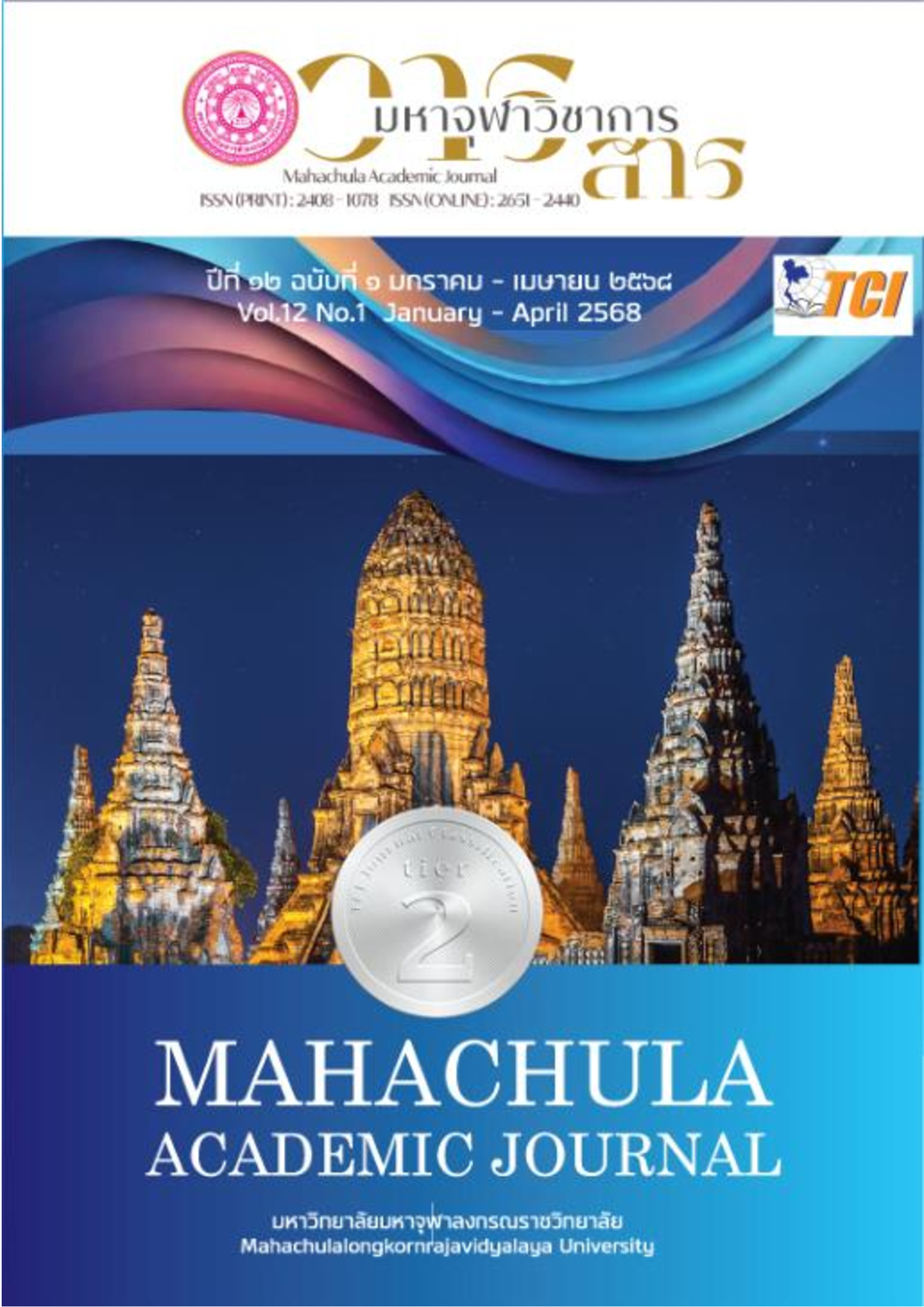Environmental Management by Monks in Highland Areas for Sustainable Social Development in Alignment with the SDGs
Main Article Content
Abstract
Environmental management in highland areas is a critical issue for Thailand, as these regions serve as vital natural resource reserves that play a significant role in maintaining ecosystem balance. This article focuses on the role of Buddhist monks in Thai society in fostering sustainability in highland areas by integrating Buddhist principles with the Sustainable Development Goals (SDGs). The study highlights their contributions to environmental conservation, education, and health promotion within communities. Buddhist monks act as spiritual leaders and community focal points, implementing initiatives that support sustainable resource use, such as reforestation, waste management, and sustainable agricultural practices. Moreover, they serve as mediators and advisors in resolving community conflicts. Buddhist environmental management approaches, such as the principles of contentment and the sufficiency economy, are employed to encourage reduced consumption, resource conservation, and ecosystem restoration. In addition, the monks play a key role in enhancing the quality of life in various dimensions, particularly in improving health and education in remote communities. Through activities that promote knowledge, understanding, and community participation, they help raise public awareness of environmental significance.
This article underscores the significant contribution of Buddhist monks in advancing multiple SDGs, particularly Goal 3 (Good Health and Well-being), Goal 4 (Quality Education), and Goal 15 (Life on Land). Collaboration among monks, communities, and relevant organizations has resulted in sustainable development that balances conservation with the responsible use of natural resources. Key recommendations include providing support in terms of resources, knowledge, and network-building to ensure the monks’ initiatives become a driving force for long-term sustainability.
Article Details

This work is licensed under a Creative Commons Attribution-NonCommercial-NoDerivatives 4.0 International License.
References
จิตติมา เสนาไชย. “บทบาทวัดในการส่งเสริมสุขภาพชุมชน: กรณีศึกษาวัดพระธาตุดอยสะเก็ดจังหวัดเชียงใหม่”. วารสารพุทธศาสตร์ศึกษา. ปีที่ ๖ ฉบับที่ ๒ (กรกฎาคม-ธันวาคม ๒๕๕๘): ๙๔.
ชญานิน จันทรวิจิตร์ และ พินิจ ลาภธนานนท์. “บทบาทด้านการศึกษาสงเคราะห์ของวัดและพระสงฆ์ต่อเด็กด้อยโอกาสทางการศึกษาในพื้นที่ชายแดนแม่สอด”. วารสาร มจร สังคมศาสตร์ปริทรรศน์. ปีที่ ๗ ฉบับที่ ๑ (มกราคม-มีนาคม ๒๕๖๑): ๑๓๘.
พระครูพิลาสธรรมากร (ณัฐพล ประชุณหะ) และคณะ. “การพัฒนาเชิงพื้นที่ของพระบัณฑิตอาสาและพระธรรมจาริกเพื่อแก้ปัญหาความยากจนของราษฎรบนพื้นที่สูง”. รายงานวิจัย. มหาวิทยาลัยมหาจุฬาลงกรณราชวิทยาลัย ทุนอุดหนุนการวิจัยจากกองทุนส่งเสริมวิทยาศาสตร์ วิจัยและนวัตกรรม, ๒๕๖๖.
พระครูสมุห์วัลลภ ฐิตสํวโร และคณะ. “เครือข่ายพระนักพัฒนา: แนวปฏิบัติและกระบวนการพัฒนาคุณภาพชีวิตของกลุ่มชาติพันธุ์บนพื้นที่สูง”. วารสารพุทธศิลปกรรม. ปีที่ ๕ ฉบับที่ ๒ (กรกฎาคม – ธันวาคม ๒๕๖๕) : ๑๑.
พระธรรมปิฎก (ป. อ. ปยุตฺโต). เศรษฐศาสตร์แนวพุทธ. กรุงเทพมหานคร: สำนักพิมพ์โกมลคีมทอง, ๒๕๓๘.
พระพรหมบัณฑิต (ประยูร ธมฺมจิตฺโต). “ศาสนากับเป้าหมาย การพัฒนาที่ยั่งยืน (SDGs)”. ใน สารนิพนธ์พุทธศาสตรบัณฑิต ๒๕๖๒. อยุธยา: มหาวิทยาลัยมหาจุฬาลงกรณราชวิทยาลัย, ๒๕๖๒.
พุทธทาสภิกขุ. สันโดษไม่เป็นอุปสรรคแก่การพัฒนา. กรุงเทพมหานคร : สำนักพิมพ์ภาพพิมพ์, ๒๕๓๙.
มหาจุฬาลงกรณราชวิทยาลัย. พระไตรปิฎกภาษาไทย ฉบับมหาจุฬาลงกรณราชวิทยาลัย. กรุงเทพมหานคร: โรงพิมพ์มหาจุฬาลงกรณราชวิทยาลัย, ๒๕๓๙.
สกุณา คงจันทร์ และคณะ. “แนวปฏิบัติและกระบวนการฟื้นฟูสิ่งแวดล้อมของเครือข่ายพระนักพัฒนาบนพื้นที่สูง : พื้นที่ต้นแบบ อำเภอฮอด แม่แจ่ม แม่สะเรียง”. วารสารพุทธศาสตร์ศึกษา. (ปีที่ ๑๔ ฉบับที่ ๒ กรกฎาคม - ธันวาคม ๒๕๖๖): ๒๔.
สมเด็จพระญาณสังวร. สันโดษ. กรุงเทพมหานคร: สำนักพิมพ์อมรินทร์ปริ้นติ้งกรุ๊ป, ๒๕๓๓.
สำนักงานคณะกรรมการวิจัยแห่งชาติ (วช.) และหน่วยงานภายใต้ปฏิญญาเชียงใหม่. ยุทธศาสตร์การวิจัยพื้นที่สูง (พ.ศ.๒๕๕๕-๒๕๕๙). กรุงเทพมหานคร: สำนักงานคณะกรรมการวิจัยแห่งชาติ (วช.), ๒๕๕๕.
Brundtland, G.. Report of the World Commission on Environment and Development: Our Common Future. United Nations General Assembly document A/42/427, 1987.
กัลยาณมิตร. “วัดบ้านขุน จ. เชียงใหม่”. [ออนไลน์]. แหล่งที่มา: https://kalyanamitra.org/th/article_detail.php?i=4265&utm_source=chatgpt.com [๑๗ มีนาคม ๒๕๕๑].
United Nations. “Transforming Our World”. in The 2030 Agenda for Sustainable Development. [Online]. Available: https://sustainabledevelopment.un.org/post2015/transformingourworld/publication.
United Nations. “The Sustainable Development Goals Report 2023”. in United Nations Publications. [Online]. Available: https://unstats.un.org/sdgs/report/ 2023/.


